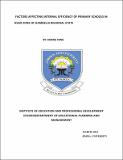| dc.description.abstract | The general objective of this study was to assess the internal efficiency of primary schools of
Nuer Zone of Gambella Regional State. The study endeavors to identify the major trends that
may affect positively or negatively, primary education efficiency of the zone. To achieve these
objective descriptive research studies was conducted. The quantitative data was collected from
principals, unit leaders, department heads by using available sampling and teachers using
simple random sampling, annual abstracts and report through questionnaires were presented,
analyzed and interpreted by using standard deviation frequency count, mean, grand mean and
percentage. Qualitative data was collected from students and parents by using focused group
discussion and interview. Parents were selected using purposive sampling and that of student
using simple random sampling. Ten primary schools were selected randomly which comprised
(13%) of the total primary schools. The zonal trend of dropout rate and repetition rate of upper
primary schools was showing oscillating with varying increase and decrease over the years but
it ended up with an increasing trend, whereas the trend of dropout rate increased in 2012/13 by
0.98% and that of repetition rate trend increase by 1.85% in 2012/13 respectively. The average
grand mean of 10 sampled primary schools showed increased trend of dropout rate by 0.56%
and that of repetition increased by 1.60%. Based on the research finding, some of the major
factors causing for students dropout rate and repetition were; students over age group;
principals, teachers, unit leaders and department heads have low education academics
background; most parents are illiterate and with low standard of living; the long distance from
home to school, students family standard of living, shortage of school facilities and involvement
in family work were mentioned as the major challenging factors for dropout. High students
section ratio, students- teachers’ ratios and lack of adequate student text books were the major
challenging factors for repetition. To solve these problems, the researcher recommends actions
in order to enhance parent literacy and awareness raising program; enhanced schools facilities
and resources and limiting the student’s involvement in family work were the major ones.
Finally, zonal education office, woreda education offices and schools administrators have to
work hard and provide serious follow up to make schools show continuous trend in decreasing
student dropout and repetition. | en_GB |


